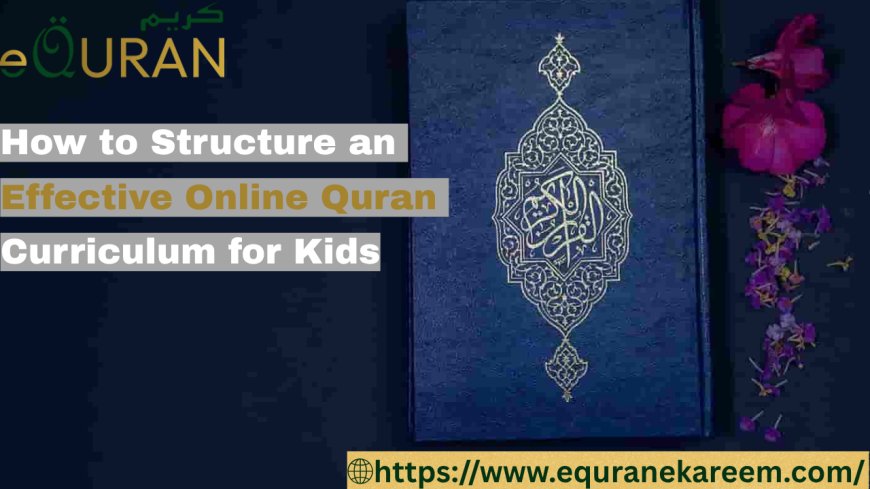How to Structure an Effective Online Quran Curriculum for Kids
Learn how to structure an effective online Quran curriculum for kids with age-based plans, engaging methods, and key components like Qaida, Tajweed, and Hifz. Perfect for parents and educators seeking structured Islamic learning.

Quran classes for kids have become a popular and effective method for Islamic education. However, the key to success lies in how well the curriculum is structured. A thoughtfully designed curriculum ensures that children learn the Quran progressively while developing a strong spiritual foundation.
Why Structured Online Quran Classes Matter
Weekly and monthly lesson plans provide a structured roadmap for Quran learning, helping track progress and set achievable goals. They ensure balanced coverage of Qaida, Tajweed, memorization, and Islamic studies. To get started with a well-structured program, explore our Quran Classes for Kids designed for effective and engaging learning.
Provides Clear Learning Goals
A structured curriculum offers defined objectives, helping children understand what they will learn and how theyll progress over time.
Encourages Consistent Learning
Regular and organized lesson plans make it easier for children to absorb knowledge and stay motivated.
Builds a Strong Islamic Foundation
A well-structured online Quran program goes beyond memorization, instilling Islamic values, proper pronunciation, and understanding of the Quran.
Components of an Effective Quran Curriculum for Kids
An effective Quran curriculum for kids includes foundational Arabic reading (Noorani Qaida), Tajweed rules, guided Quran recitation, and structured memorization. It also integrates Islamic studies like Duas, manners, and stories of the Prophets. These components ensure holistic religious and spiritual development.
Noorani Qaida (Foundational Arabic)
Every online Quran course should begin with Noorani Qaida, which teaches Arabic letters, pronunciation (Tajweed), and basic reading rules. This is essential for building strong Quranic reading skills.
Tajweed Rules
Introduce basic Tajweed early and build upon them gradually. Teach children the correct articulation (Makharij), elongation rules (Madd), and other essential recitation rules to ensure accurate reading.
Quran Reading and Recitation
Once foundational skills are strong, move into guided reading and recitation. Begin with shorter Surahs and gradually increase in length and complexity.
Quran Memorization (Hifz)
Incorporate a memorization schedule tailored to the childs age and capacity. Start with frequently recited Surahs like Al-Fatiha, Al-Ikhlas, and Al-Falaq.
Islamic Studies Integration
An effective curriculum should include basic Islamic teachings: manners (Adab), Duas, Prophet stories, and the Five Pillars of Islam to complement Quran learning.
Age-Based Structuring for Online Quran Classes
Tailoring Quran lessons to a childs age ensures they learn at a pace that matches their cognitive and emotional development. Younger kids benefit from shorter, engaging lessons, while older children can handle deeper topics like Tajweed and memorization. An age-based structure enhances retention and long-term interest in learning the Quran.
Ages 46: Introduction Stage
-
Focus on Noorani Qaida with audio-visual aids
-
Begin with basic Arabic letters and sounds
-
Introduce simple daily Duas and manners
-
Keep sessions short (1520 minutes) and engaging
Ages 79: Development Stage
-
Start applying Tajweed in short Surahs
-
Begin guided recitation from the Quran
-
Include Hifz of 35 short Surahs
-
Incorporate interactive activities and quizzes
Ages 1012: Progression Stage
-
Strengthen Tajweed knowledge and accuracy
-
Increase memorization (up to a Juz if capable)
-
Teach Tafseer basics for comprehension
-
Include writing exercises and Quran journaling
Interactive Teaching Methods to Keep Kids Engaged
Using interactive teaching methods like visual aids, games, and live tutor sessions keeps kids motivated and attentive during Quran lessons. These techniques make learning enjoyable and help reinforce concepts effectively. Engagement is key to maintaining consistency and building a strong foundation in Quranic education.
Visual and Audio Tools
Use digital whiteboards, animated stories, and recitation videos to create a multi-sensory learning environment.
Gamification
Add fun through points, rewards, badges, and competitions. This keeps children motivated and helps with memorization.
Live Interaction with Tutors
One-on-one or small group sessions with qualified Quran teachers ensure personalized attention and feedback.
Parental Involvement
Encourage parents to monitor practice, help revise lessons, and communicate regularly with tutors.
Creating Weekly and Monthly Lesson Plans
Weekly and monthly lesson plans provide a structured roadmap for Quran learning, helping track progress and set achievable goals. They ensure balanced coverage of Qaida, Tajweed, memorization, and Islamic studies.
Weekly Plan Example:
-
Monday: Noorani Qaida revision + new letters
-
Tuesday: Basic Tajweed rule + practice
-
Wednesday: Surah memorization + quiz
-
Thursday: Reading practice from the Mushaf
-
Friday: Islamic stories or Duas
-
Weekend: Parent-child review + reward session
Monthly Goals Should Include:
-
Completion of one Tajweed concept
-
Memorization of 12 Surahs
-
Mastery of specific Qaida lessons
-
Participation in an online progress test
Consistent tracking ensures long-term retention and identifies areas where the child needs more focus.
Tips for Parents Setting Up Online Quran Learning
-
Choose the Right Platform: Use secure and interactive platforms like Zoom, Skype, or specialized Islamic learning portals.
-
Maintain a Routine: Set fixed class times and a quiet learning space to improve concentration.
-
Be Patient and Supportive: Children learn at different paces. Encourage without pressure.
Conclusion
A well-structured online Quran curriculum for kids helps ensure steady, meaningful progress in their Islamic learning journey. By combining Noorani Qaida, Tajweed, Quran reading, memorization, and Islamic studies, children not only learn to recite but also understand and embody Quranic values.
FAQs
Q1: What is the best age to start learning Quran online?
Children can begin as early as age 4, focusing on Arabic letters and basic Islamic values with short, engaging lessons.
Q2: How long should online Quran sessions be for kids?
Sessions should range from 15 to 30 minutes depending on age. Younger kids benefit from shorter, more interactive lessons.
Q3: Can my child memorize the Quran online?
Yes, many online programs offer structured Hifz plans tailored to the child's ability, with regular review and support from teachers.
Q4: Do online Quran classes include Tajweed?
Effective programs integrate Tajweed from the start, teaching pronunciation rules progressively alongside reading.
Q5: How do I choose the right online Quran tutor for my child?
Look for qualified, experienced teachers who specialize in teaching children and can offer personalized, engaging lessons.


































